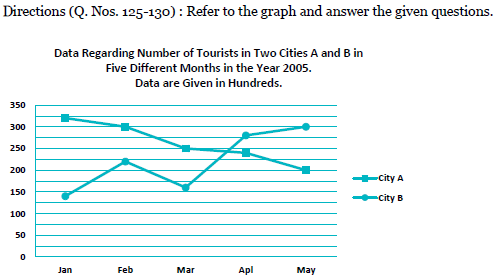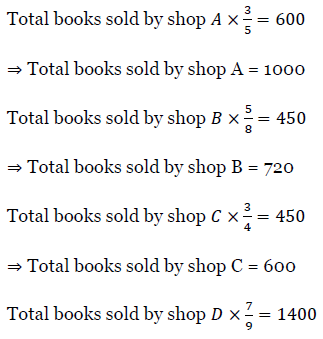IBPS : Specialist Officers Exam Paper Held On 14.02.2016 - (Quantitative Aptitude)

IBPS : Specialist Officers Exam Paper Held On 14.02.2016 - (Quantitative Aptitude)
Directions (Q101-105) : What approximate value will come in place of question mark in the given question? (You are not expected to calculate the exact value.)
Q101.

a) 4
b) 5
c) 2
d) 3
e) 6

a) 100
b) 10
c) 3
d) 30
e) 60
 a) 3
a) 3
b) 9
c) 30
d) 90
e) 80
Q104. (24.99% or 399.995) ÷ ? = (125% of 4.111)2
a) 80
b) 4
c) 60
d) 16
e) 40
Q105. √? = (1248.28 + 51.7) ÷ 99.9 ÷ 7.98
a) 49
b) 81
c) 64
d) 16
e) 25
Q106. The distance between two places A and B is 110 km. 1st car departs from place A to B, at a speed of 40 km/h at 11 am, 2nd car departs from place B to A at a speed of 50 km/h at 1 pm. At what time will both the cars meet each other?
a) 1:50 pm
b) 1:20 pm
c) 2:00 pm
d) 2:30 pm
e) 2:15 pm
Q107. In 2014, the number of female employees in department C was 5/13 of the total number of employees in same department. If the number of female employees in department F was 4 less than that in department C, what is the number of male employees department F?
a) 41
b) 42
c) 58
d) 54
e) 48
Q108. In 2014, there were 25% post graduate employees in department B. In 2015, 22 employees of the same department were shifted to Branch ‘PQR’. If in 2015, the percentage of post graduate employees in Department B became 28%, how many post graduate employees were shifted to branch ‘PQR’?
a) 8
b) 12
c) 6
d) 4
e) 14
Q109. What is the average number of employees in departments A, D and F?
a) 65
b) 70
c) 75
d) 72
e) 69
Q110. In department E, the respective ratio between the number of female employees and male employees was 5 : 4. There were equal number of unmarried males and unmarried females in department E. If the respective ratio between married females and married males was 3 : 2, what is the number of unmarried females?
a) 6
b) 15
c) 12
d) 4
e) 8
Q111. What is the central angle corresponding to the number of employees in department E?
a) 43.2°
b) 46.5°
c) 41.6°
d) 42.8°
e) 45.9°
Q112. The number of employees in department E is what percent less than the number of employees in departments A, B and C together?
a) 72%
b) 60%
c) 65%
d) 70%
e) 68%
Q113. In the year 2013, the population of a village A was 20% more than the population of village B. The population of village A in 2014 increased by 10% as compared to the previous year. If the population of village A in 2014 was 5610, what was the population of village B in 2013?
a) 4650
b) 5550
c) 4250
d) 5800
e) 4500
Q114. Five years ago, the respective ratio between the age of Opi and that of Mini was 5 : 3. Nikki is 5 years younger to Opi. Nikki is five years older to Mini. What is Nikki’s present age?
a) 35 years
b) 25 years
c) 20 years
d) 10 years
e) 30 years
Q115. Mohan gave 25% of a certain amount of money to Ram. From the money Ram received, he spent 20% on buying books and 35% on buying a watch. After the mentioned expenses, Ram has Rs. 2700 remaining. How much did Mohan have initially?
a) Rs. 16000
b) Rs. 15000
c) Rs. 24000
d) Rs. 27000
e) Rs. 20000
Directions (Q.116-121) : What will come in place of question mark in the given number series?
Q116. 849 282 93 30 9 ?
a) 1
b) 3
c) 4
d) 6
e) 2
Q117. 18 20 14 26 6 ?
a) 18
b) 26
c) 32
d) 28
e) 36
Q118. 12 13 20 39 82 ?
a) 259
b) 232
c) 210
d) 198
e) 173
Q119. 18 18.8 20.4 23.6 30 ?
a) 44.4
b) 43.5
c) 49.2
d) 49.6
e) 42.8
Q120. 17 9 10 16.5 35 ?
a) 85
b) 70
c) 92.5
d) 90
e) 84.5
Q121. 6 4 5 11 ? 189
a) 82
b) 39
c) 44
d) 65
e) 96
Q122. 16 men and 10 women together can complete a project in 10 days. If 12 women can complete the project in 25 days, in how many days 10 men complete the same project?
a) 28 days
b) 24 days
c) 18 days
d) 26 days
e) 10 days
Q123. A and B started a business with an investment of Rs. 2800 and Rs. 5400 respectively. After 4 months, C joined with Rs. 4800. If the difference between C’s share and A’s share in the annual profit was Rs. 400, what was the total annual profit?
a) Rs. 13110
b) Rs. 12540
c) Rs. 17100
d) Rs. 11400
e) Rs. 14250
Q124. The interest earned when Rs. ‘P’ is invested for five years in a scheme offering 12% p.a. simple interest in more than the interest earned when the same sum (Rs. P) is invested for two years in another scheme offering 8% p.a. simple interest, by Rs. 1100. What is the value of P?
a) Rs. 2500
b) Rs. 2000
c) Rs. 4000
d) Rs. 3500
e) Rs. 3000

Q125. What is the average number of tourists in city B in February and march?
a) 18000
b) 23000
c) 19000
d) 21000
e) 17500
Study Kit for IBPS Specialist Officer Exam
Q126. Number of tourists in city B in April are what percent more than that in city A in march?
a) 20%
b) 18%
c) 12%
d) 25%
e) 8%
Q127. What is the respective ratio between the total number of tourists in city A in January and February together and that in city B in the same months together/
a) 25 : 11
b) 16 : 9
c) 30 : 17
d) 16 : 11
e) 31 : 18
Q128. In the month of June that year, the total number of tourists in both the cities together reduced by 40% from the previous month. What was the number of tourists in both the cities together in June?
a) 32000
b) 40000
c) 20000
d) 42000
e) 30000
Q129. What is the difference between the total number of tourists in cities A and B together in may and that in march?
a) 10000
b) 9000
c) 7000
d) 8000
e) 9500
Q130. The number of tourists in city A in April is what percent less than that in the same city in January?

Directions (Q131-136) : Study the table and answer the given questions. Data regarding number of books sold in either hard bounds or paperback editions and also the categories of books sold in Fiction and Non-Fiction category, by four different shops, in a particular month (January, 2014)
Book Respective Number of Percentage
Shop Ratio Paperbacks of Fiction
Between Sold Out of (Hard bound
Number of Total Number + Paperback)
Hard bounds of Books Sold Sold Out of
Sold and
Number of Total Books
Paperbacks
Sold Sold
A 2 : 3 600 45
B 3 : 6 450 75
C 1 : 3 450 50
D 2 : 7 1400 60
Total books sold = Number of hard bounds sold + Number of paperbacks sold As per given information,

⇒ Total books sold by shop D = 1800
Now, number of hardbound sold by shop A = 1000 – 600 = 400
Number of hardbound sold by shop
B = 720 – 450 = 270
Number of hardbound sold by shop
C = 600 – 450 = 150
Number of hardbound sold by shop
D = 1800 – 1400 = 400
Percentage of non-fictions sold by shop
A = 100 – 45 = 55%
Percentage of non-fictions sold by shop
B = 100 – 75 = 25%
Percentage of non-fictions sold by shop
C = 100 – 50 = 50%
Percentage of non-fictions sold by ship
D = 100 – 60 = 40%
Q131. What is the respective ratio between the number of non-fiction sold by shop C and number of non-fiction sold by shop B?
a) 10 : 2
b) 5 : 2
c) 5 : 3
d) 7 : 3
e) 7 : 4
Q132. In February, 2014, the number of paperback editions sold by shop D was 5% more than the same sold by the same shop in the previous month. The number of paperback editions sold in February, 2014 by shop D constituted 75% of the total number of books sold by shop D in February 2014. What was the total number of books sold in February 2014 by shop D?
a) 1840
b) 2040
c) 1960
d) 2080
e) 2400
Q133. Number of non-fictions sold by shop C is what percent of number of nonfictions sold by shop D?
a) 38%

d) 60%
e) 31%
Q134. Total number of books sold by shop is what percent more than sold by shop C?
a) 50%

d) 30%
e) 20%
Q135. What is the average number of fictions sold by shops A and B?
a) 475
b) 470
c) 495
d) 480
e) 490
Q136. Number of hardbound editions sold by shop B is what percent less than that sold by shop D?
a) 30%
b) 36.75%
c) 25%
d) 32.5%
e) 40.25%
Directions (Q137-141) : Each question consist of a question and two statements numbered I and II given below it. You have to decide whether the data given in statements are sufficient to answer the questions. Read both the statement and
Give answer
a). If the data in statement I alone are sufficient to answer the question, while
the data
in statement II alone are not sufficient to answer the question
b). If the data in statement II alone are sufficient to answer the question,
while the
data in statement I alone are not sufficient to answer the question
c) If the data either in statement I alone are sufficient or in statement II
alone are
sufficient to answer the question
d) If the data in both statements together are necessary to answer to question
Q137. What is the area of the circular field?
I. Area of the largest square that can be inscribed in the given circular field
is 392
cm2.
II. Area of the smallest square in which the given circular field can be
inscribed is 784
cm2.
Q138. What was the initial quantity of mixture of juice and water?
I. Juice and water were in the ratio of 6 : 1 respectively in the mixture
initially.
II. When 7 litres of mixture is taken out and 5 litres of water is added the
ratio
between juice and water becomes 8 : 3 respectively.
Q139. What is the curved surface area of the right circular cylinder?
I. Area of the base of the cylinder is 616cm2.
II. Volume of the cylinder is 9240 cm2.
Q140. In how many days can ‘B’ alone complete the work?
I. A, B and C together can complete the work in days.
days.
II. A and B together can complete the work in
 days. B and C together can complete the work together in
days. B and C together can complete the work together in
 days and A and (together can complete the work in
days and A and (together can complete the work in
 days.)
days.)
Q141. How much money did Ms. Malini receive retirement funds?
I. Out of the total money received Ms. Malini gave 25% to her husband and 10% to
her daughter. Out of the remaining she invested 30% in Mutual funds, 60% in
pension Fund Scheme and remaining Rs. 260000 she spent on miscellaneous items.
II. Out of the total money received Ms. Malini invested 58.5% In various
schemes,
gave 35% of the total money received to her husband and daughter and remaining
money she spent on miscellaneous items.
Q142. The speed of a boat in still water is 16 km/h and the speed of the current is 2 km/h. The distance travelled by the boat from point A to point B downstream is 12 km more than the distance covered by the same boat from point S to point upstream in the same time. How much time will the boat take to travel from C to B downstream?
a) 3 h
b) 2 h 30 min
c) 2 h 20 min
d) 2 h 20 min
e) 2 h
Directions (Q. Nos. 143-148) : In the following questions, two equations numbered I and II are given solve both the equations and
Give answer
a) if x > y
b) if x ≥ y
c) if x < y
d) if x ≤ y
e) if x = y or the relationship cannot be established
Q143. I. x2 – 6x + 9 = 0
II. 4y2 – 15y + 14 = 0
Q144. I. 2x2 – 9x + 4 = 0
II. y2 – 14y + 40 = 0
Q145. I. x2 – 10x + 25 = 0
II. y2 – 9y + 20 = 0
Q146. I. 4x2 – 13x + 10 = 0
II. 2y2 – 15y + 22 = 0
Q147. I. 30x2 + 17x + 2 = 0
II. 3y2 + 8y + 4 = 0
Q148. I. 6x2 + 11x + 3 = 0
II. 20y2 + 9y + 1 = 0
Q149. A jar has 40 L milk. From the jar, 8 L of milk was taken out and replaced by an equal quantity of water. If 8 L of the newly formed mixture is taken out of the jar, what is the final quantity of milk left in the jar?
a) 32.5 L
b) 30 L
c) 25.6 L
d) 24.2 L
e) 24 L
Q150. Two mobile phones were purchased at the same price. One was sold at a profit of 20% and second was sold at a price, which was Rs. 1520 less than the price at which the first was sold. If the overall profit earned by selling both the mobile phones was 1%, what was the cost price of one mobile phone?
a) Rs. 6000
b) Rs. 5200
c) Rs. 4800
d) Rs. 4000
e) Rs. 5000
